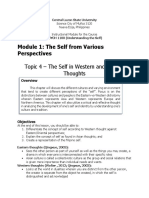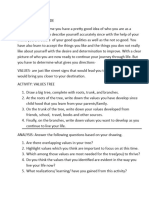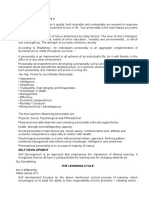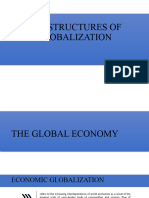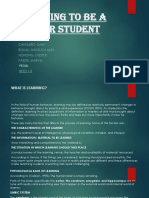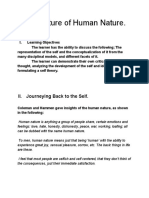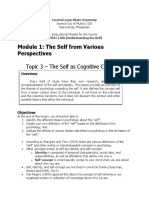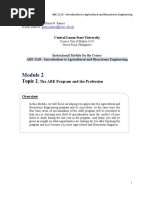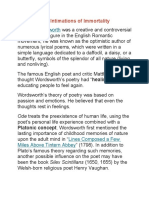Module 1: The Self From Various Perspectives
Uploaded by
Lord GrimModule 1: The Self From Various Perspectives
Uploaded by
Lord GrimCentral Luzon State University
Science City of Muñoz 3120
Nueva Ecija, Philippines
Instructional Module for the Course
PSYCH 1100 (Understanding the Self)
Module 1: The Self from Various
Perspectives
Topic 1 – Philosophical Perspective of
Understanding the Self
Overview
In this chapter, discussions of different perspectives and
understandings of the “self” according to its prime movers, from philosophers
of the ancient time to the contemporary period. In addition, through self-
reflection and essay questions as learning activity and assessment in this
chapter, students learn how to explain, describe, compare and examine one’s
self against the different views of the self.
I. Objectives
At the end of this lesson, you should be able to:
1. Explain why it is essential to understand the self;
2. Describe and discuss the different notions of the self from the points-of-view of
the various philosophers across time and place;
3. Compare and contrast how the self has been represented in different
philosophical schools; and
4. Examine one’s self against the different views of self that were discussed in
class.
The Self from Various Philosophical Perspectives
Self is defined to as “a unified being, essentially connected to consciousness,
awareness, and agency (or, at least, with the faculty of rational choice).” Across
generations, self has been the topic of understanding which covers the different factors
that contribute one’s being and identity.
Chafee (2013) enumerated the different perspectives and understandings of the
“self” according to its prime movers, from philosophers of the ancient time to the
contemporary period. Below are the different standpoints according to Chafee (2013)
that shape our views on “self” today.
Socrates and Plato
• Socrates was the first philosopher who ever engaged in a systematic
questioning about the self; the true task of the philosopher is to know
oneself.
• For Socrates, every man is composed of body and soul; all individuals have
an imperfect, impermanent aspect to him, and the body, while maintaining
that there is also a soul that is perfect and permanent.
• Plato supported the idea that man is a dual nature of body and soul.
• Plato added that there are three components of the soul: the rational soul,
the spirited soul, and the appetitive soul.
Augustine and Thomas Aquinas
• Augustine agreed that man is of a bifurcated nature; the body is bound to die
on earth and the soul is to anticipate living eternally in a realm of spiritual
bliss in communion with God.
• The body can only thrive in the imperfect, physical reality that is the world,
whereas the soul can also stay after death in an eternal realm with the all-
transcendent God.
• Aquinas said that indeed, man is composed of two parts: matter and form.
Matter, or hyle in Greek, refers to the “common stuff that makes up
everything in the universe.” Man’s body is part of this matter. Form, on the
other hand, or morphe in Greek refers to the “essence of a substance or
thing.”
• To Aquinas the soul is what animates the body; it is what makes us humans.
Rene Descartes
• Conceived of the human person as having a body and a mind
• The body is nothing else but a machine that is attached to the mind. The
human person has it but it is not what makes man a man. If at all, that is the
mind.
David Hume
• The self is not an entity over and beyond the physical body.
• Men can only attain knowledge by experiencing.
• Self, according to Hume, is simply “a bundle or collection of different
perceptions, which succeed each other with an inconceivable rapidity, and are
in a perpetual flux and movement.”
Immanuel Kant
• Things that men perceive around them are not just randomly infused into the
human person without an organizing principle that regulates the relationship
of all these impressions.
• There is necessarily a mind that organizes the impressions that men get from
the external world.
• Time and space are ideas that one cannot find in the world, but is built in our
minds; he calls these the apparatuses of the mind.
• The self is not just what gives one his personality; it is also the seat of
knowledge acquisition for all human persons.
Gilbert Ryle
• Blatantly denying the concept of an internal, non-physical self; what truly
matters is the behavior that a person manifests in his day-to-day life.
• “Self” is not an entity one can locate and analyze but simply the convenient
name that people use to refer to all the behaviors that people make.
Merleau-Ponty
• The mind and body are so intertwined that they cannot be separated from
one another.
• One cannot find any experience that is not an embodied experience. All
experience is embodied; one’s body is his opening toward his existence to the
world.
• The living body, his thoughts, emotions, and experiences are all one.
1. Enrichment Task
Watch: https://www.youtube.com/watch?v=ybCAXqkzPhw
References
Alata, E.J., et al. (2018) Understanding the Self. Rex Books Store. ISBN.
13:9789712386701
Chafee, J. (2013) Who are You? Consciousness, Identity and the Self. In the
Philosopher’s Way: Thinking Critically about profound Ideas. Pearson. 106 – 109.
You might also like
- The Holy Guardian Angel: A Chaotic Perspective100% (1)The Holy Guardian Angel: A Chaotic Perspective9 pages
- From Various Perspectives: PhilosophicalNo ratings yetFrom Various Perspectives: Philosophical33 pages
- Chapter 2 Lesson 3 Managing The Material SelfNo ratings yetChapter 2 Lesson 3 Managing The Material Self37 pages
- LESSON 3 Ethical Relativism, Moral Subjectivism and The Ambivalence of Filipino Cultural ValuesNo ratings yetLESSON 3 Ethical Relativism, Moral Subjectivism and The Ambivalence of Filipino Cultural Values6 pages
- Chapter 2 Lesson 6 The Self in The Digital and Virtual WorldNo ratings yetChapter 2 Lesson 6 The Self in The Digital and Virtual World22 pages
- Who I Am in The Cyber World (Digital Self)No ratings yetWho I Am in The Cyber World (Digital Self)16 pages
- Module 3THE SELF FROM VARIOUS PERSPECTIVE PHILOSOPHERSNo ratings yetModule 3THE SELF FROM VARIOUS PERSPECTIVE PHILOSOPHERS27 pages
- Fundamentals of Effective Communication in The Workplace100% (1)Fundamentals of Effective Communication in The Workplace26 pages
- Universal Values: Murillo, Mark Louis A. Bsece 1 - ANo ratings yetUniversal Values: Murillo, Mark Louis A. Bsece 1 - A13 pages
- Understanding The Self - 1st Sem Prelim TOPIC 1 5No ratings yetUnderstanding The Self - 1st Sem Prelim TOPIC 1 510 pages
- Managing Personal Problems: The Customer and Company ImageNo ratings yetManaging Personal Problems: The Customer and Company Image19 pages
- The Difference Between Morals and EthicsNo ratings yetThe Difference Between Morals and Ethics2 pages
- The Self in Western and Eastern Thought PDFNo ratings yetThe Self in Western and Eastern Thought PDF11 pages
- Dynamics of Inter and Intrapersonal Relations ReviewerNo ratings yetDynamics of Inter and Intrapersonal Relations Reviewer11 pages
- Love, Infatuation, Friendship, Exploitation100% (1)Love, Infatuation, Friendship, Exploitation13 pages
- The Self According To The Perspective of AnthropologyNo ratings yetThe Self According To The Perspective of Anthropology1 page
- Learning Packet 5 UTS The Self in Western and Eastern ThoughtsNo ratings yetLearning Packet 5 UTS The Self in Western and Eastern Thoughts24 pages
- Chapter 1 (Latest) - The Concept of Educational Sociology50% (2)Chapter 1 (Latest) - The Concept of Educational Sociology25 pages
- Difference Between Society and CommunityNo ratings yetDifference Between Society and Community2 pages
- Understanding Self and Others in the Postmodern WorldFrom EverandUnderstanding Self and Others in the Postmodern WorldNo ratings yet
- Chapter 1 - Lesson 1 - The Self From Various Philosophical PerspectivesNo ratings yetChapter 1 - Lesson 1 - The Self From Various Philosophical Perspectives3 pages
- 2021 - AFPE - PPT - Chap08 - Fans and BlowersNo ratings yet2021 - AFPE - PPT - Chap08 - Fans and Blowers38 pages
- 2 - Solar Energy Sources and UtilizationNo ratings yet2 - Solar Energy Sources and Utilization58 pages
- Performance Analysis of Conventional LPGNo ratings yetPerformance Analysis of Conventional LPG5 pages
- Module 1: The Self From Various PerspectivesNo ratings yetModule 1: The Self From Various Perspectives3 pages
- Module 1: The Self From Various PerspectivesNo ratings yetModule 1: The Self From Various Perspectives3 pages
- BAJUM, ALRENCE, A. Laboratory Exercise No. 3No ratings yetBAJUM, ALRENCE, A. Laboratory Exercise No. 35 pages
- THE Leadership Capital Index: Realizing The Market Value of Leadership by Dave Ulrich100% (1)THE Leadership Capital Index: Realizing The Market Value of Leadership by Dave Ulrich23 pages
- Accreditation Visit For Bachelor of Science in Computer Science Program PurposeNo ratings yetAccreditation Visit For Bachelor of Science in Computer Science Program Purpose2 pages
- Solution Handbook For Time-Harmonic Electromagnetic Fields by R. F. HarringtonNo ratings yetSolution Handbook For Time-Harmonic Electromagnetic Fields by R. F. Harrington23 pages
- Effective Church Leadership and The Lay: The Role of The Presbyterian Young AdultNo ratings yetEffective Church Leadership and The Lay: The Role of The Presbyterian Young Adult21 pages
- An Evaluation of the use of Marking Schemes in the Teaching and Learning of Commerce at Ordinary level: A Case Study of Five (5) Secondary Schools in Chiefs Sayi and Jiri areas in Gokwe South District, Midlands, Zimbabwe.No ratings yetAn Evaluation of the use of Marking Schemes in the Teaching and Learning of Commerce at Ordinary level: A Case Study of Five (5) Secondary Schools in Chiefs Sayi and Jiri areas in Gokwe South District, Midlands, Zimbabwe.19 pages
- A Walk Through Nature As A Spiritual ExerciseNo ratings yetA Walk Through Nature As A Spiritual Exercise1 page
- Alparskan Açıkgenç, Language, Epistemology and ScienceNo ratings yetAlparskan Açıkgenç, Language, Epistemology and Science38 pages
- William Wordsworth: Ode: Intimations of Immortality100% (1)William Wordsworth: Ode: Intimations of Immortality9 pages







